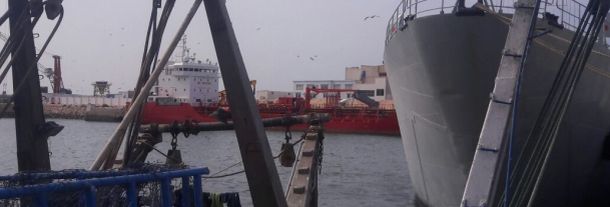
The Spanish government in a statement yesterday confirmed the EU court's judgement that Western Sahara goods are not covered by the EU-Morocco trade deal. Spain states it is up to France to make sure the controversial trade of fish oil from 'Key Bay' vessel was properly tariffed.
On 16 March 2017, the Spanish government explicitly stated that products from Western Sahara are not covered by the EU-Morocco trade agreements.
The consequences of this, is that cargoes such as the fish oil which was on board a vessel that stopped over on the Canary Islands in January 2017 cannot be granted tariff reduction. After bunkering in Las Palmas, the chemical tanker 'Key Bay' sailed to France, where she discharged the entire cargo of fish oil, destined to the importer Olvea.
As the vessel stopped over in Las Palmas, the vessel was boarded by Spanish police and harbour authorities. The Spanish government confirmed yesterday that the information it collected have thus been communicated to French customs (presumably confirming WSRW's doubts on the validity of the export documents), and that it is now up to France to take its responsibility.
This is, to WSRW's knowledge, the first public statement from Madrid on the non-applicability of the EU-Morocco trade agreements to products from Western Sahara. In the absence of a discussion in the European Council and of European Commission instructions on the implementation of the CJEU ruling, EU member states seem divided on how to deal with Western Sahara goods.
The 'Key Bay' affair was the first confirmed transport of fish products into the EU after the landmark judgement on 21 December 2016, of the Court of Justice of the EU which ruled that Western Sahara products cannot be covered by the EU-Moroccan trade agreements.
The ruling was in line with the opinion of Northern European states. However, the EU, with pressure from France, has until now treated goods from Western Sahara as if they were Moroccan. France, alongside Spain, is an important importer of both fisheries and agriculture products made in the territory under Moroccan occupation. France is also the state in the UN Security Council that backs up Morocco in all aspects of the occupation, including in preventing the UN forces to report on human rights violations in the territory. France last year also prevented the Security Council to enforce a return of UN troops unilaterally kicked out of Western Sahara by Morocco.
The question about the Spanish government's position on the imports fish products was first submitted by the Spanish member of Congress Jorge Luis Bail of the Spanish party Unidos Podemos/EQUO on 18 January 2017.
The text below is our unofficial English translation of the complete answer.
Answer from the Government (16.03.2017)
Question 184/6803 18/01/2017 15326
[Submitted by] Jorge Luis Bail (GCUP-ECP-EM)
The CJEU judgement of 21st December 2016 only establishes that the commercial benefits granted to Morocco by the Euro-Mediterranean Agreements are not applicable to Western Sahara, given that it is not part of the territory of the Kingdom of Morocco.
The Agreements, foresee the reduction or exemption of the custom duties. Their implementation is competence of the custom authorities of the Member State that receives the application to import the goods.
Hence, there is no custom limit to the free circulation of these products within the EU territory. It is thus impossible to adopt any precautionary or definitive measures regarding the vessel or its cargo.
Nonetheless, in order to assure that the Agreement was correctly implemented, and taking into account the CJEU judgement, we informed the custom authorities in France and Denmark, countries of destination of the shipment, of the proven facts, in the framework of mutual assistance in customs of the EU Member States.
In addition to that, in case the vessel or its cargo were affected by other non-customary limitations, the corresponding court was also informed of the facts.
Key Bay unloaded all cargo in Fécamp, France
A lighter Key Bay is on its way to Ghent, Belgium
Here is the Key Bay inside the port of Fécamp
Beautiful images of a vessel with an ugly cargo; fish oil taken illegally from an occupied land; the Key Bay in the port of Fécamp.


